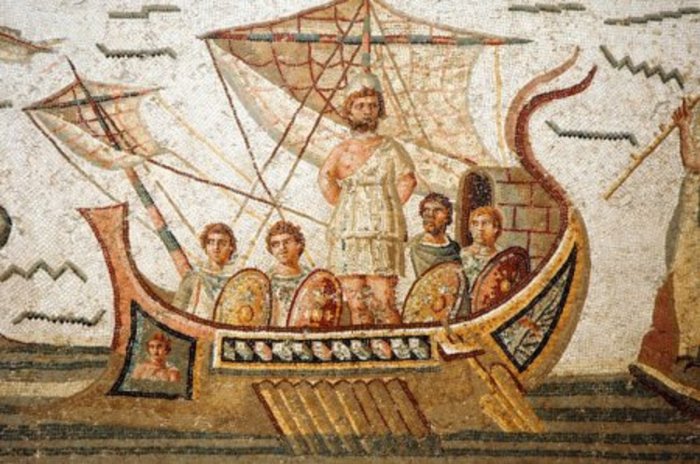In organizing the events of Odysseus’s quest, Homer’s Odyssey presents a timeless tale of a hero’s arduous journey fraught with obstacles, divine interventions, and profound themes. This epic narrative serves as a testament to the human spirit’s resilience and the enduring power of storytelling.
Odysseus’s quest, a paradigm of the hero’s journey, unfolds through a series of distinct stages, each marked by challenges and opportunities for growth. The gods, with their intricate motivations and actions, play a pivotal role in shaping the course of his odyssey, testing his mettle and guiding his destiny.
1. The Hero’s Journey
The hero’s journey is a narrative structure that describes the stages of a hero’s journey from home, through a series of challenges, and back home again. Joseph Campbell Artikeld the following stages:
- Departure: The hero leaves home to embark on a journey.
- Initiation: The hero faces challenges and trials that test their character.
- Return: The hero returns home with newfound knowledge and experience.
Odysseus’s quest follows this structure:
- Departure: Odysseus leaves home to fight in the Trojan War.
- Initiation: Odysseus faces challenges such as the Cyclops, the Sirens, and the underworld.
- Return: Odysseus returns home to Ithaca.
The hero’s journey structure enhances the narrative of Odysseus’s quest by providing a framework for understanding his journey and the challenges he faces.
2. The Role of the Gods
The gods play a significant role in Odysseus’s quest. They intervene in his journey, both helping and hindering him.
- Athena: Athena supports Odysseus throughout his journey, providing him with guidance and protection.
- Poseidon: Poseidon opposes Odysseus, causing him to face many challenges.
- Zeus: Zeus oversees Odysseus’s journey and ultimately determines his fate.
The gods’ interventions impact the outcome of Odysseus’s journey, testing his character and shaping his destiny.
3. Obstacles and Challenges
Odysseus faces numerous obstacles and challenges during his quest.
- The Cyclops: Odysseus and his men are captured by the Cyclops Polyphemus.
- The Sirens: Odysseus and his men must resist the enchanting song of the Sirens.
- The Underworld: Odysseus travels to the underworld to seek guidance from the prophet Tiresias.
These obstacles test Odysseus’s character, forcing him to use his wit, courage, and resilience to overcome them.
4. Themes and Symbolism

The Odyssey explores several central themes:
- Loyalty: Odysseus’s loyalty to his home and family is tested throughout his journey.
- Hospitality: The importance of hospitality is emphasized in the Odyssey.
- Fate: The role of fate in human life is a recurring theme.
Symbols are also used throughout the epic:
- The bow: Odysseus’s bow is a symbol of his strength and authority.
- The ship: Odysseus’s ship is a symbol of his journey and his determination to return home.
- The sea: The sea is a symbol of both danger and opportunity.
Themes and symbolism contribute to the overall meaning of the story, providing insights into human nature and the human condition.
5. Literary Devices

Homer employs various literary devices in the Odyssey:
- Similes: Homer uses similes to create vivid and memorable descriptions.
- Metaphors: Homer uses metaphors to convey complex ideas and emotions.
- Foreshadowing: Homer uses foreshadowing to create suspense and build anticipation.
These literary devices enhance the storytelling and create a rich and immersive experience for the reader.
6. Impact and Legacy: In Organizing The Events Of Odysseus’s Quest

The Odyssey has had a profound impact on Western literature and culture:
- Influence on literature: The Odyssey has influenced the works of many great writers, including Virgil, Dante, and Shakespeare.
- Cultural significance: The Odyssey has become an integral part of Western mythology and culture.
- Enduring appeal: The Odyssey continues to be read and enjoyed by readers today.
The enduring appeal and relevance of Odysseus’s quest in contemporary society lie in its timeless themes of loyalty, courage, and resilience.
FAQ Insights
What is the significance of the hero’s journey in Odysseus’s quest?
The hero’s journey provides a structured framework for understanding Odysseus’s trials and triumphs, highlighting the universal challenges and growth opportunities faced by heroes throughout literature.
How do the gods influence the outcome of Odysseus’s journey?
The gods, with their complex motivations and powers, intervene at key moments, aiding or hindering Odysseus’s progress. Their actions reflect the interplay between fate, free will, and the role of the divine in human affairs.
What are the central themes that emerge from Odysseus’s quest?
Themes such as loyalty, courage, the search for home, and the resilience of the human spirit are woven throughout the Odyssey, providing insights into the universal human experience.